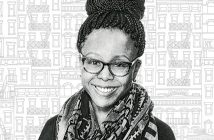Fordham’s new tax law expert on driving tractors, studying religion, and testifying before Congress
Stretching back to a one-room schoolhouse in a rural farming community in Indiana in the 1800s, Rebecca Kysar’s family tree is rooted in teaching, and she represents the fourth generation in the long, unbroken line. As a rising star in the world of the tax legislative process and international tax law and as Fordham Law’s newest full-time professor, she admirably carries on her family’s legacy.
Kysar has made waves in both the political and academic spheres of late, for her April 2018 testimony before Congress on the GOP’s tax bill and for her work on a December 2017 article she co-authored with several other leading tax experts on loopholes in the same bill.
But long before she was testifying before the U.S. Senate, she was driving tractors and picking strawberries on a farm in rural Indiana during summer breaks from Indiana University, where she majored in religious studies. After college, Kysar enrolled at Yale Law School, where she eventually gravitated toward tax law while working as a summer associate at Paul, Weiss LLP. Later, she practiced in the tax department at Cravath, Swaine, and Moore LLP.
Kysar acknowledges that her path strikes most people as out of the ordinary, but she finds many parallels between her undergraduate and graduate work. “People are surprised that I went from religious studies to tax law,” she says, “but both are systems of organizing and incentivizing human behavior, and both encompass the whole shebang, from cradle to grave.”
As her interest in tax law grew, Kysar kept being pulled back to her family’s pedagogical roots. “During my time in private practice, I was also thinking about academia,” she says. “I enjoyed the fact that the tax bar remained fairly close to policy and theoretical issues.” Since both academics and practitioners work on similar issues in modern tax law, Kysar knew she could teach while also making her voice heard on current tax developments.
With her religious studies background, Kysar is especially adept at teasing out the philosophical implications of tax law. “If you look beneath the complexities of the system,” she notes, “you will see value judgments as to what kind of country we think we should be.” In working through answers to basic questions such as What does this tax law incentivize? and Who is benefiting from these tax cuts?, she uncovers even more important questions: How much inequality should we tolerate as a society? and What is distributively just?
Before the U.S. Senate, her voice found a powerful stage. During her April 24 testimony, Kysar noted the legislation’s $1.9 trillion addition to the federal deficit and she enumerated four major problems with its international provisions: first, new international rules aimed at intangible income incentivize offshoring and profit shifting; second, the new patent box regime will not likely increase innovation, causes WTO problems, and is easily gamed; third, the new inbound regime has too generous thresholds, which allow multinationals with significant revenue and assets to engage in a great deal of tax planning; and fourth, the new regime falls short of true international tax reform.
Kysar’s testimony draws on her influential work on “The Games They Will Play: Tax Games, Roadblocks,
and Glitches Under the New Legislation”—the most downloaded academic paper of 2017 on the Social Science Research Network. “Congress had no hearings on the bill, and it was rushed through in a matter of weeks,” she explains. “I think the paper was so widely read because it filled a gap in the process.”
“There was little opportunity to respond to the legislation through formal legislative channels,” she continues, “so our paper filled that void. Unfortunately, Congress did little to address our concerns during the process.”
Despite her relative dissatisfaction with the congressional response, Kysar plans to continue making her voice heard. She, along with her co-authors, is working on an updated version of “The Games They Will Play,” scheduled for publication in The Minnesota Law Review in 2019, which will reflect the latest administrative, international, taxpayer, and state responses to the new law. She has also been working closely with the aides of several Democratic representatives and senators on bills that would change aspects of the new law’s international provisions. “The hope is that even if these cannot be passed now, they lay an agenda for when political tides turn,” she says.
As she continues this influential work, Kysar is excited to have returned to Fordham Law as a full-time professor. During the fall 2017 semester, she served as a visiting professor at Fordham after spending nine years as a professor at Brooklyn Law School.
“Fordham is a top institution with fantastic professors, particularly in the business and tax areas,” she notes. “Its graduates are well represented among the best firms in the world, and I think it is inspiring to be able to teach tax to people who will be on the cutting edge of the practice.”
With the new tax code shaking things up, Kysar believes that it is a great time to enter the field. “There is so much demand for expertise in interpreting and planning around the new provisions,” she explains. With all the law’s changes, young lawyers are “on a more level playing field with more senior tax lawyers, since the old planning playbook can no longer be followed.”




